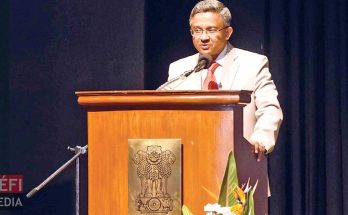As India strives to grow on the back of international trade, regional connectivity becomes very crucial to achieve domestic objectives and geopolitical ambitions. Apparently, with a focus on improving connectivity in Asia, India’s External Affairs Minister Sushma Swaraj in the inaugural address of Raisina Dialogue said that larger regional cooperation will prevail over vested interests that block it.
Mrs Swaraj addressed a gathering of delegates on March 1 at the Raisina dialogue, India’s international conclave on geopolitics and geo-economics. The event was also attended by Hamid Karzai former President of Afghanistan, Chandrika Kumaratunga former President of Sri Lanka and Bangladesh’s Foreign Minister Abul Hassan Mahmood Ali.
Stressing on the necessity to improve connectivity, Mrs Swaraj said, “While resources and capabilities drive the pace of connectivity, policy choices can be a critical factor. Even in South Asia, we have seen that good neighbourly ties can have a strong beneficial effect on building road and rail connections, opening waterways or supplying energy. The desire to cooperate has spawned institutions, bodies and groupings in different regions. SAARC, as you all know, is our local example and one where we are still striving to realise its full potential.” She also spoke about the success in sub-regional cooperation through initiatives such as BBIN which has helped in improving connectivity.
Emphasising that terrorism was hurting economic growth, Mrs Swaraj further said: “In its most radical form, this emanates from the spread of terrorism, which has mutated to keep pace with the march of technology. As a result, we confront the spectre of cyber attacks even as we struggle with violence inspired by medieval beliefs. Use or threat of use of force by nations in territorial disputes is another source of concern. Dissuasion and diplomacy are part of the answers in such situations.”
Mrs Swaraj also spoke about how India has implemented its “Neighbourhood First” policy and focused on a range of agreements that India had entered into with Bangladesh, Bhutan and Nepal. She mentioned the trilateral highway project between India, Myanmar and Thailand will improve connectivity between South Asia and Southeast Asia.
Mrs Swaraj stressed on the importance of cyber connectivity in an increasingly digital world.
Lack of trust among South Asian countries
Speaking about the lack of trust among South Asian countries, Mr Karzai said that they were the obstacles to prosperity and growth in the region. He singled out Pakistan’s policy blocking India’s path to Kabul, Central Asia, Russia and beyond. He also said that during his Presidency Islamabad had tried to influence Kabul’s foreign policy towards other countries.
Putting the onus on India and Pakistan, Mrs Kumaratunga said: “Lack of political will is preventing and lack of trust between India and Pakistan is not helping integration and growth in South Asia.”
Mr Ali focussed on several steps taken towards sub-regional cooperation involving Delhi and Dhaka besides Nepal and Bhutan.
Author Profile
- India Writes Network (www.indiawrites.org) is an emerging think tank and a media-publishing company focused on international affairs & the India Story. Centre for Global India Insights is the research arm of India Writes Network. To subscribe to India and the World, write to editor@indiawrites.org. A venture of TGII Media Private Limited, a leading media, publishing and consultancy company, IWN has carved a niche for balanced and exhaustive reporting and analysis of international affairs. Eminent personalities, politicians, diplomats, authors, strategy gurus and news-makers have contributed to India Writes Network, as also “India and the World,” a magazine focused on global affairs.
Latest entries
 DiplomacyApril 10, 2024Diplomat-author Lakshmi Puri pitches for women power at LSR
DiplomacyApril 10, 2024Diplomat-author Lakshmi Puri pitches for women power at LSR India and the WorldApril 6, 2024UN envoy pitches to take India’s solutions to the world stage
India and the WorldApril 6, 2024UN envoy pitches to take India’s solutions to the world stage CultureApril 5, 2024Youth in Diplomacy: Making it Matter with LSR Model UN 2024
CultureApril 5, 2024Youth in Diplomacy: Making it Matter with LSR Model UN 2024 India and the WorldMarch 28, 2024India to China: Normalization of troops deployment imperative for restoring ties
India and the WorldMarch 28, 2024India to China: Normalization of troops deployment imperative for restoring ties








